ALISHA BOE
Next Level
With Solid Footing In Television, Including Her Breakout Role In Beloved Netflix Series, 13 Reasons Why, Alisha Boe Intrigues In Jesse Eisenberg's Indie, When You Finish Saving The World, Begging The Question: What's Next?
PHOTOS BY RANDALL SLAVIN
WORDS BY TAMARA RAPPA
Listen to the extended podcast interview ---find Story + Rain Talks and Alisha’s episode 127---on Apple Podcasts, Spotify, and more.
Tamara Rappa: You were born in Norway, but grew up in Los Angeles, and became immersed in acting at an early age. What drew you to pursue a drama program and acting?
Alisha Boe: Even in Norway, I was performing in some capacity; I would be in after school programs, and being that I was so young, I'd play a tree in the play that they were putting on. I was a ballerina. I just loved the attention of performing. When I moved to the States, I continued with extracuricullar acting. It's a funny culture in Los Angeles...when you're a kid and you're interested in acting, you go right to an acting class and then you start doing commercials and print work. It was something that was just part of my life growing up. I'd go to school, then maybe I'd have a print job or a commercial audition. When I was 16, I started taking it more seriously, and began booking jobs to a point where I couldn't really keep up with my school work. I decided to home school myself, but wasn't a choice, really, it was luck and dedication to acting and auditioning. I landed my first big role, 13 Reasons Why, when I was 19.
TR: You came to this country before you were 7 years old. What sparked the acting bug at such a young age?
AB: Now that I'm thinking about it, there were a couple of girls in my school in Norway who were a bit older than me, who I think I really looked up to. This one particular girl booked some TV show, on one of the local Norwegian channels, and I was like, 'That is just the coolest thing.' The feeling of being able to perform was so special to me and almost felt like second nature; it was something that I felt I needed to do. It was so ingrained in my personality, it felt like a given. I was lucky to have a mom who really supported me. She was a single mom when we were in Norway, and she wanted to let me do anything that would make me happy while she was going to school and working. She'd make sure we'd get the bus and I'd be able to go to my dance class, or stay longer at school to be able to perform in plays. She'd get me all of these costumes and do my makeup. She was this mom who really paid attention to what her child was interested in. She supported and stood behind me, full force.
"It took me maybe one year to become a little valley girl. "
TR: Your father is Somali and your mother is Norwegian; you still visit Norway currently. What was it like being this international kid in Los Angeles, in the land of Hollywood and the world of acting?
AB: I remember the night before we moved to Los Angeles, being in Oslo, we had packed all our bags, and we had prepared for the move for about a year. The reason why we moved is because my mom met my stepdad, and he lived in Los Angeles. We picked the place where it's, you know, summer for most of the year rather than winter! I was so excited, but the night before, I was crying, because I was leaving all my friends and my family, and it was scary. My English was close to zero, and it was going to be a big adjustment. I had no siblings, I was an only child at the time. This was a big move. Then, I remember landing in Los Angeles and it was October, sunny skies and palm trees, and my mom always reminds me that I was doing cart wheels out of the terminal! Where we lived was so far removed from Hollywood, we moved to very the deep west of the Valley, which is suburbia. It was a big adjustment because I had so much independence in Oslo, I could ride my bike around the neighborhood, go to the store and the shop person knew me. It was probably what I imagine what America was like in the '50s or '60s. At that point I was so upset because my independence was taken away. I couldn't walk to school by myself. I couldn't go to 7-11 to get a candy bar. And culturally, it was just so different. I was bullied for having an accent. Being different when you're a kid...becomes amplified...and then you're ashamed of it. I very quickly wanted to learn English, I wanted to learn as fast as possible. I was in this program called Hooked On Phonics. We'd go to the library, and this lady would teach me how to read and write in English. That led to me not really wanting to speak Norwegian, and it ultimately led me to me kind of forgetting the language, also because the main language in our house was English, my stepdad being American. Los Angeles could not be more different than Norway. But it took me maybe one year to become a little valley girl.
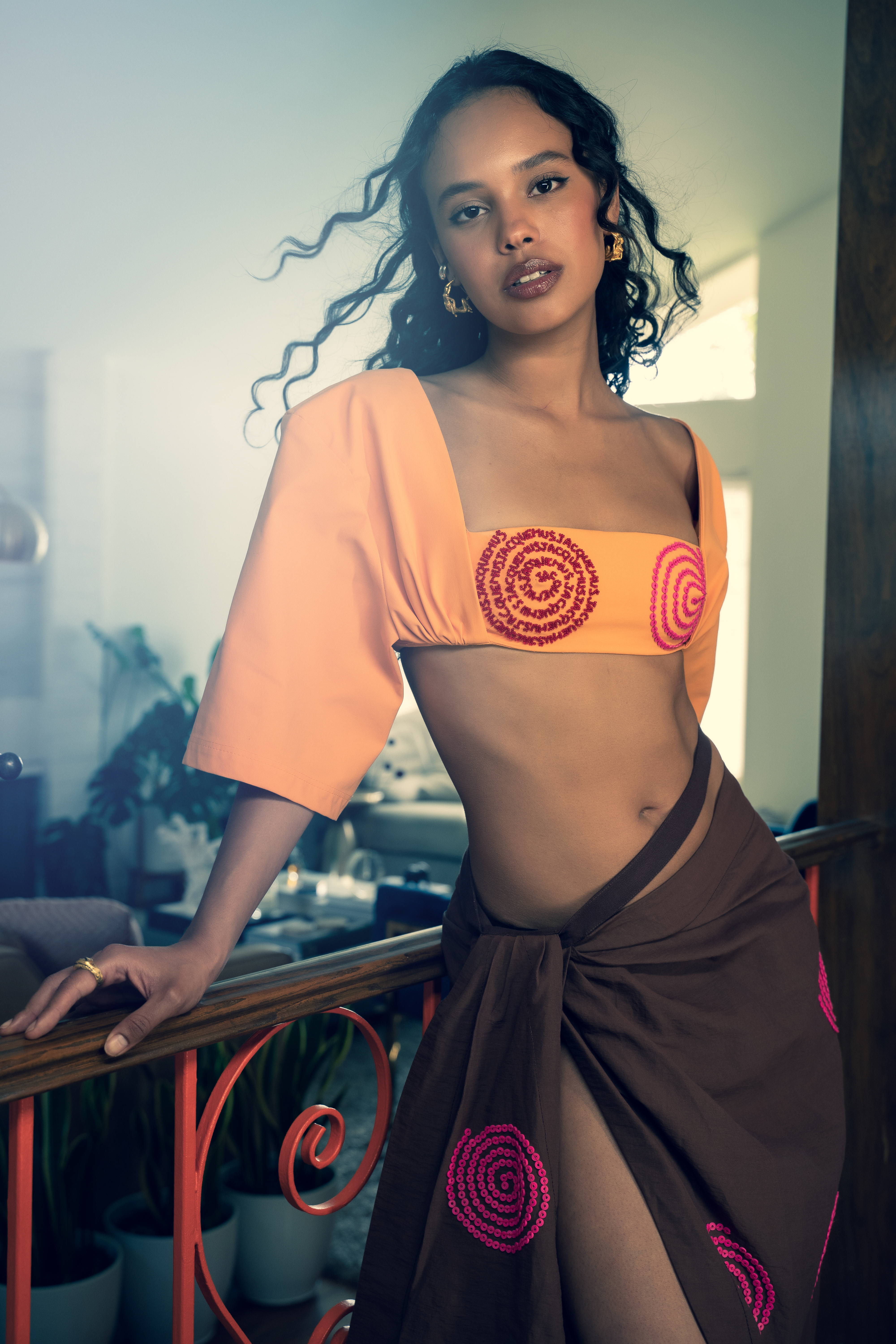
A B O V E P H O T O : T o p a n d s k i r t , S t e l l a M c C a r t n e y ; C h o k e r , S t o r y + R a i n V i n t a g e. T H I S P H O T O : T o p , s k i r t , a n d s h o e s, J a c q u e m u s; e a r rin g s , A l e j a n d r a d e C o s s.
TR: As a kid, what kind of film and television content had an impact on you? Who were the actors you were looking at? Once you were in the United States and had the opportunity to absorb all this American content, what was catching your eye in those grade school and early high school years?
AB: Nothing impressive, for sure! I was so obsessed with Full House, because when I was really young they would air all the reruns. I loved Full House, and I wanted to be Michelle so badly.
"When I was a teenager, I'd lose a lot of sleep Googling different movies and watching them. "
TR: Full House seems to really resonates with kids...even the new version of Full House, Fuller House. My nephews love it.
AB: I think it's the feeling of this cozy family. And Bob Saget always has this big speech in the middle of the episode, the girls always learn something, and of course, Uncle Jesse is so beautiful to look at. I remember being about 8 and looking at credits and thinking, ok this is a producer on Full House, we need to call this producer so I can get on the show...not even realizing the show had ended in the '90s! I was a very business-oriented child. [laughs] I loved That's So Raven, I loved Raven Symone. I loved Family Matters---all of these very American sitcoms. There were six channels on basic cable in Norway before TV exploded, but here there were so many reruns of old shows. As I got older, during my teenage years, a lot of people watched Skins. I remember it really shaping who I was. And with movies, I would hyper-fixate on a particular actor. I remember being really into Joseph Gordon-Levitt for a while, so I watched Mysterious Skin by Gregg Araki, and I watched all of his earlier movies. I really love Jennifer Lawrence, and I started with Winter's Bone, and then watched everything she did before Winter's Bone. I remember really getting into these weird independent dramas that I'd find online on a crappy website. When I was a teenager, I'd lose a lot of sleep Googling different movies and watching them. I didn't realize at the time that I had a weird passion for people's performances, wanting to study them, and study actors' career paths.
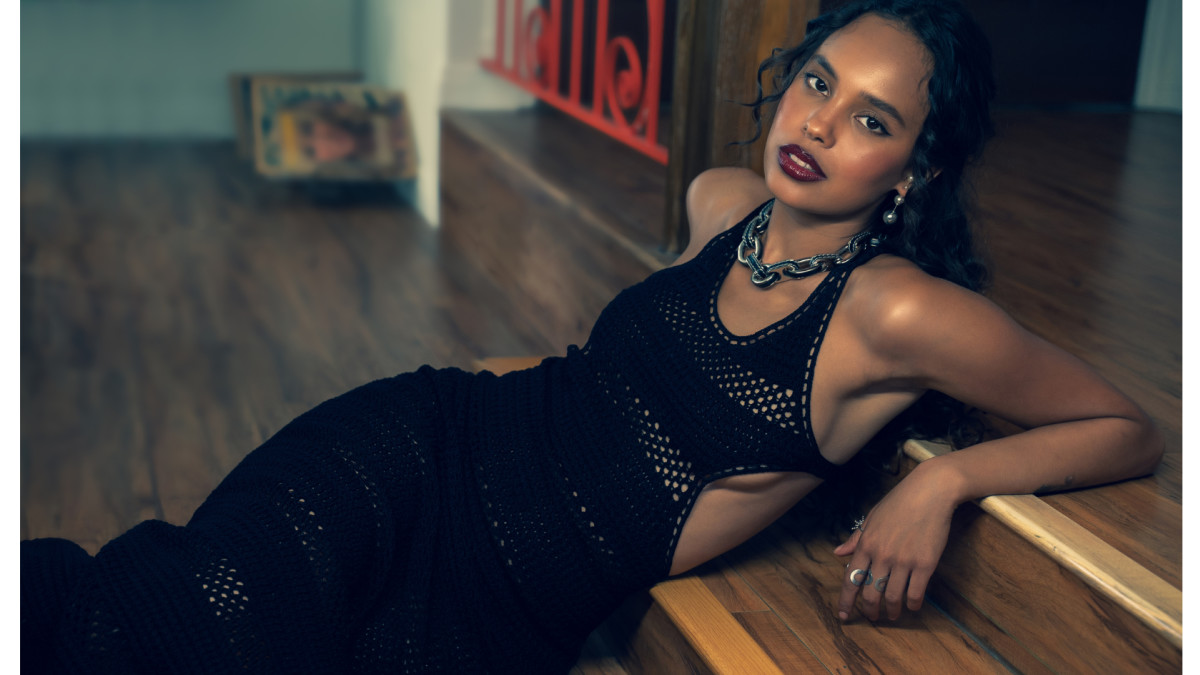
Dress and necklace, Saint Laurent; vintage Michael Kors necklace, Clothed LA. Earrings, Lilou Paris; ring, Pianagonda.
TR: Before Netflix's 13 Reasons Why, and what's described as your breakout role as Jessica Davis, there had been multiple other roles for you on TV on highly visible series like Ray Donovan, Hulu's Casual, MTV's Teen Wolf, CSI, opposite Patricia Arquette. When you think about your work in those roles, what comes to mind? Who were you, and how did you develop as an actor?
AB: I think about that time so fondly because it was so exciting as an actor; you're just scratching the surface. It was so exciting...each audition....then, each call back...and then booking it. And then there's when you're supposed to only be in one episode, but then they like you, so they keep bringing you back. That was the time when I was home schooled. I was lucky enough to be working too much. I was 17 at the time, I'd moved out of my house and into a really small apartment in central Hollywood. I remember finishing up high school while being on these sets---able to meet Jon Voight, and Liev Schreiber, and work with Patricia Arquette---in these very minor roles, but ones that had such beautiful arcs, ones that really taught me a lot about being comfortable on set...which is its own art. I was able to create these beautiful relationships with these amazing people who have worked in the industry for so long. It was just such an exciting time in my life. I was working on Ray Donovan at the same time I was working on CSI, at the same time I was working on Teen Wolf. It was a year of being able to visit as many sets as possible.
TR: You got to work on three key projects, all very different. You must have learned so much just by having to toggle between them.
AB: I was so young, but I didn't realize how young I was, I thought I was such an adult because I was paying rent, but I didn't have my high school diploma yet, I had no life experience in truly being an adult, while this huge growing process was taking place. I was maturing as I was working and learning on those sets. Had I not had that experience, and gone straight into leading roles, I think I'd be a bit lost. I'm grateful I had that experience, grateful for those couple of years, being able to be a pure student, being able to rub shoulders, briefly but so intensely, with these people I respect so much.
"I remember finishing up high school while being on these sets---able to meet Jon Voight, and Liev Schreiber, and work with Patricia Arquette---in these very minor roles, but ones that had such beautiful arcs, ones that really taught me a lot about being comfortable on set...
which is its own art."
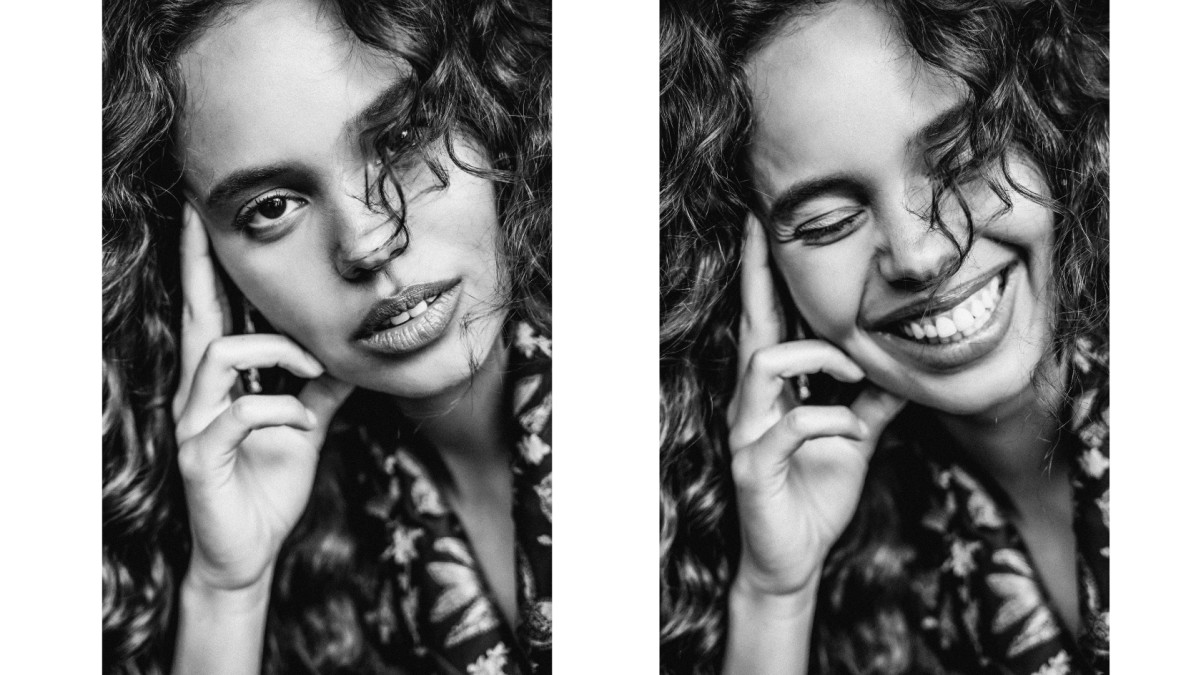
Jacket, Etro.
TR: Your recent film, When You Finish Saving the World, Jesse Eisenberg's directorial debut, a story he wrote, was named by Hollywood Reporter as one of 20 best films of Sundance 2022. How did Jesse, an established actor, first time director, and someone who conceived of the story that you helped tell, go about bringing his vision to light?
AB: Let's talk about when the project came to be, because it was such an interesting time for all of us in the world. We'd all been locked up in our houses, gone through quarantine, and it was such an early stage in the reestablishing of work in film industry. It was so exciting for me, personally, because I hadn't worked for the full year. I wrapped 13 Reasons Why in December of 2019. Then, January, February, March of 2020, is when the world locked up. I had been used to working so much, so used to being involved in a TV show, so used to being so stimulated. Then it became complete stillness, something we all experienced. I am so grateful for that time, because it was a good time to be able to decompress and look back on everything that just had happened in the last four or five years of my life...my silver lining, in a world that was kind of falling apart. I remember reading the script for When You Finish Saving the World and being so excited about it. Then I thought, 'Oh my gosh, am I too old to play Finn Wolfhard's lover?' I was able to speak with Jesse beforehand, and he explained so beautifully that, as Lila, I was supposed to be unattainable for Finn's character. I'm supposed to remind him of his mother, played by Julianne Moore. He explained that there's supposed to be this big discrepancy between our maturity levels. It was this weird push and pull dynamic that I hadn't seen before in a love interest role, and I was really excited to explore that. And in any movie I watch, if there is a parent-child dynamic, and two hours are spent exploring it---that always fascinates and moves me. So I was excited to be a part of the story.
"I am so grateful for that time, because it was a good time to be able to decompress and look back on everything that just had happened in the last four or five years of my life...my silver lining, in a world that was kind of falling apart."
TR: What did you observe about Jesse, someone who was in the process of directing something for the first time? Was there anything that you noted, or that you learned from?
AB: First of all, I'm a fan of Jesse's to begin with, and I was nervous to work with him. What I really appreciate about his process was that, because he's an actor, and this was his first time directing a movie, was just how open and giving and collaborative he was, and how good he was at putting everyone else at ease. That's what I really appreciated about him as director: he was so open to communication, he made such a lovely atmosphere on set with the other actors and the crew and the cinematographer and the producers. It's a project that's so personal to him because he wrote it and directed it, and there are personal elements to it. It was a loving set, really.
"I thought, 'Oh my gosh, am I too old to play Finn Wolfhard's lover?' "
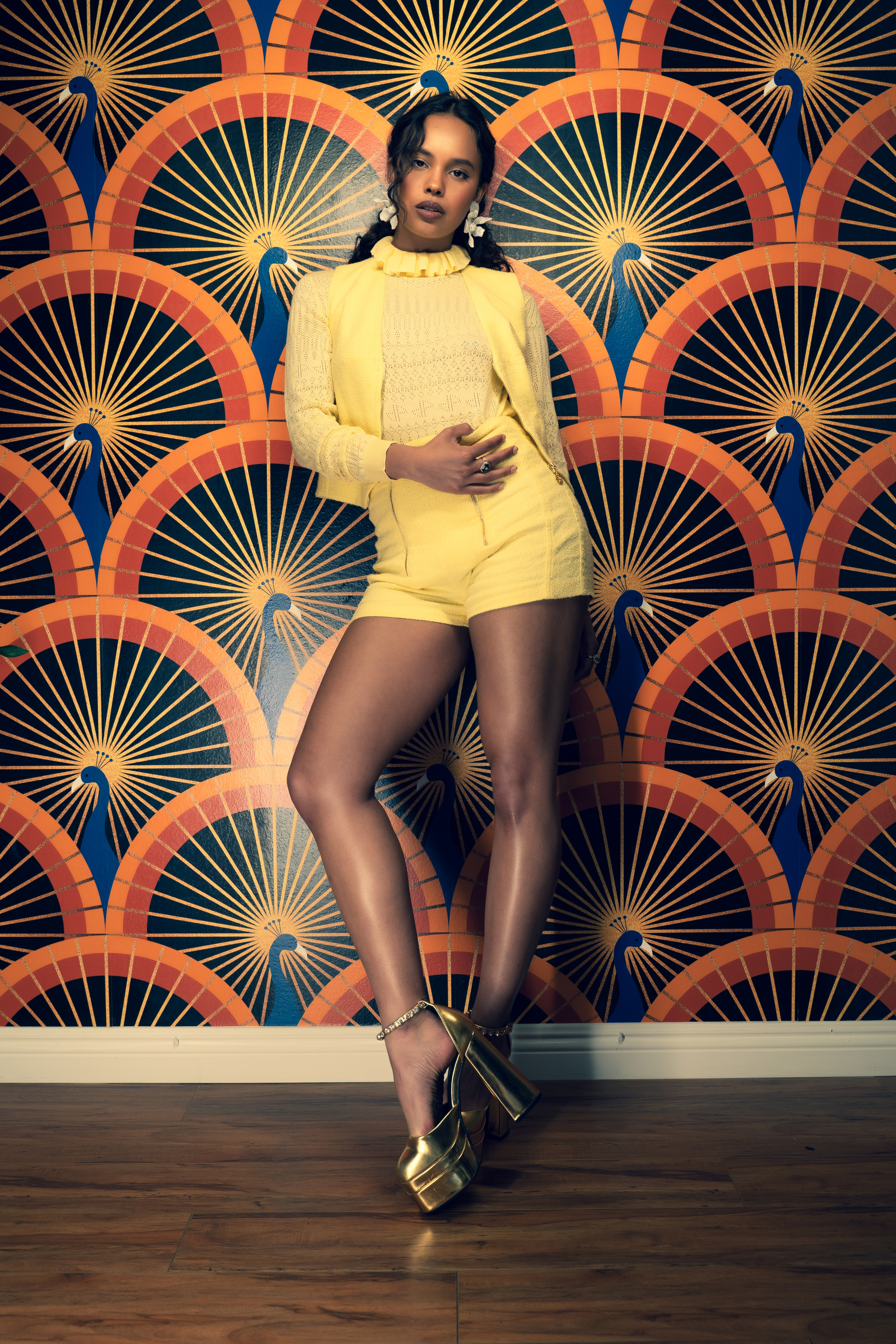 S w e a t e r , v e s t , a n d s h o r t s , P a t o u.
S w e a t e r , v e s t , a n d s h o r t s , P a t o u.
E a r r i n g s , L e l e S a d o u g h i; s h o e s , E g o.
TR: How is your character Lila similar to you, namely in how she differs from Finn Wolfhard's Ziggy? You've been involved with various charitable organizations in a number of different ways; Lila has her own eyes open to the citizens of the world, she's politically and socially engaged. Is there a similarity there?
AB: The only similarity is that we care about what's happening in the world in an authentic way, not in a performative way. Other than that, we are so, so different, I was not that smart in high school, I was not that engaged [laughs], in high school. I cared more about, like, drinking out of kegs. She has her head screwed on correctly. I find that kids, Gen Z in particular, and kids who are in high school or middle school today---have access to so much information, they're able to be so politically active, way more than I think my friends and I were in high school, even though we're only ten years apart. Lila's very shy and socially awkward, and has an interest in one specific thing, it's her whole focus, her whole agenda. My brain can't focus on just one thing. She's quite different from me in that way.
"I find that kids, Gen Z in particular, and kids who are in high school or middle school today---have access to so much information, they're able to be so politically active, way more than I think my friends and I were in high school, even though we're only ten years apart."
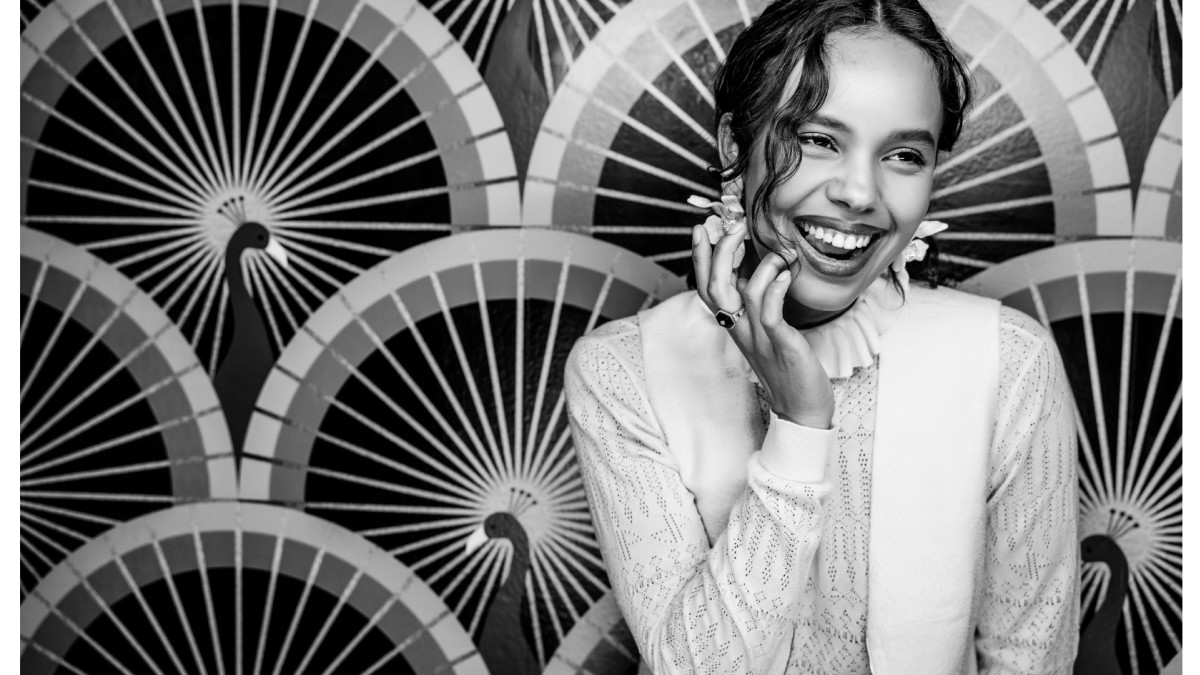
Sweater and vest, Patou. Earrings, Lele Sadoughi.
TR: You've worked with some really interesting and talented people behind the camera. Is there anyone whom you've collaborated with to date, who's made an impact on how you work today?
AB: There are many, really. I find that every director I work with, because the director-actor relationship is so intimate and so trusting, and there are so many personalities, teaches you how to perform, how to live in characters' worlds and stories; in ways you wouldn't have ever thought of or dreamed of. It also gives you the skill to be able to work with different people in different ways. There are certain actors who you'll meet, and then it goes beyond the project you're working on. You learn from each other through your collaboration together. It moves you. You create this beautiful relationship and collaboration, and it inspires you in a way it couldn't have, without them. That's the whole world of what we do. We couldn't do any of it on our own. You need to work with people who kind of push you and make you feel uncomfortable. I've learned from people who I didn't really get along with, and from people who didn't have the same way of working as me. It teaches you so many things, including how to move through the world you're in. It's also really interesting when you become close with the people who write for your film or your TV show, because they see it in such a different way. It's born in the text, then you take from the page and move on from it, and talk to them, going back and forth, 'Wait, I didn't think of this, I didn't think of that'. In my work, it's not a specific person for me, it's all of the people who are a part of the journey.
TR: Upcoming for you, is an Apple TV+ series, your first period piece.
AB: Yes. It's based on an unfinished Edith Wharton book called The Buccaneers. She passed away before she could finish it. It's about a group of girls in high society in New York who move to England to find husbands. It's about the contrast between new money and old money, and how the girls from new money enter this old, stiff, English society. I found it interesting that, historically, Americans at that time, were more rich than the old aristocrats of England. The aristocrat were losing money and needing money for the upkeep of all of their beautiful, stately homes and castles. The American girls are so different, culturally, from all of the English. The English have so many rules and so many ways they need to live in society, and the American girls kind of shake everything up. I really enjoyed working on it because it's such a modern take on that time period. I'm excited to see what people think about it.
"I've learned from people who I didn't really get along with, and from people who didn't have the same way of working as me. It teaches you so many things, including how to move through this world you're in."
TR: In contrast and to date, you've had so much experience in helping to tell particularly timely, modern stories. You recently stared in the Netflix film, Do Revenge, where an intimate video is leaked online---an increasingly modern day issue.
AB: Oh my gosh, yes, even when I was in school.
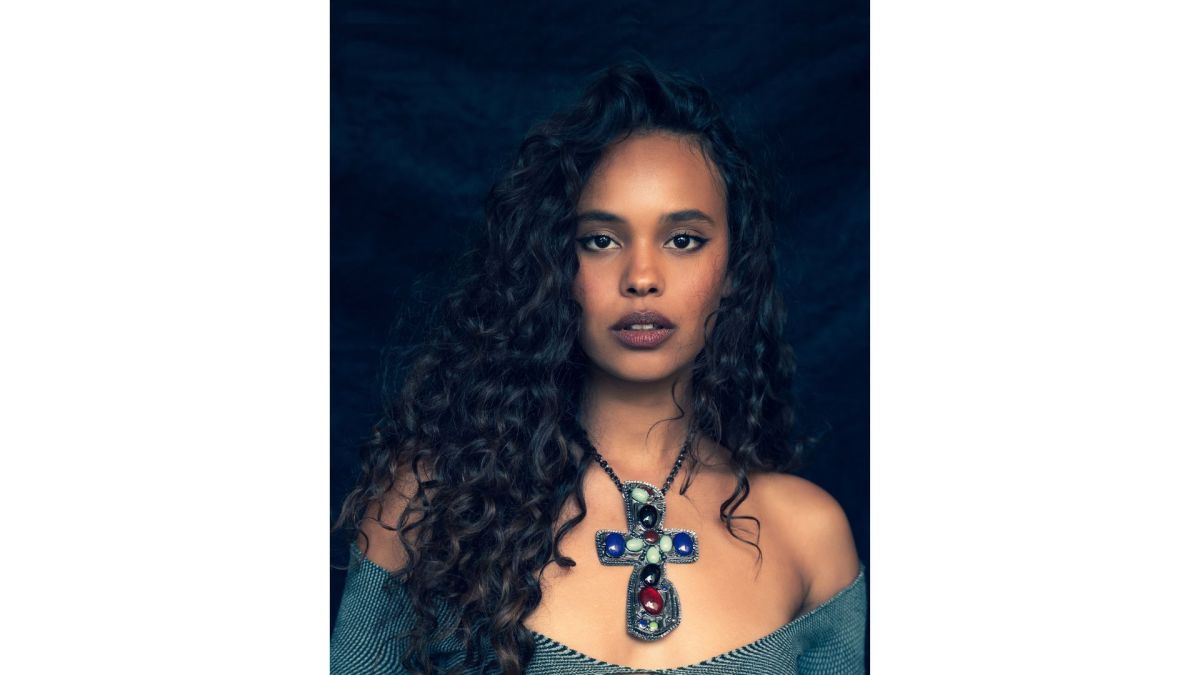
Isa Boulder dress; vintage Chanel necklace, Clothed LA.
TR: The story of 13 Reasons Why dealt with the topic of suicide, something it seems we're seeing more of. We're hearing about how depression and anxiety is on the rise, particularly in young women. Your character, Jessica Davis, is a sexual assault survivor. In season two, episode three is a pivotal episode for her, titled The Drunk Slut.
AB: I haven't talked about this in so long. I remember we were filming the second season, Jessica is going through the aftermath of her assault and she decides to press charges. Simultaneously, while we were filming, the Harvey Weinstein scandal came out. All these women were coming forward. I have this scene when I'm in court, and I have to name my assaulter. It felt so timely. Every day, we'd wake up and there would be another news article documenting the Me Too movement. More and more women were speaking out. It felt so surreal, and obviously the writers hadn't based our story on this movement that was happening.
TR: How did you begin to think about suicide and sexual assault outside of your role, during that span of time, during 13 Reasons Why?
AB: I was so young when I started the show, still a teenager, but of course I knew what sexual assault is, and suicide, and addiction. Unfortunately, kids have been dealing with all of it for years. This isn't a recent thing, it's been going on forever. I think most of us will have been touched by all of it during our lifetimes, especially when we're younger. It was something that was personal to me when we started the show, extremely personal, which is why I was so passionate about it. In having to perform it as well, I learned so much about the journey of a survivor, on a very deep, emotional level. All of a sudden, I became this person who people would talk to all the time. As a teenager, I would hear people's stories all the time, and then I'd have to go into work and perform. It became so ingrained in my life. Many people in my life would talk to me about it. Strangers would talk to me about it, about their experiences with sexual assault or rape or suicide. So it was this very heavy, personal thing in my life for a long time. And I didn't mind it, I loved it, and I felt so privileged to be able to be that person. I don't think I fully understood the scope of it while it was happening, because, how can you? I think you'd be too self important if you were thinking, 'Oh yeah, I'm this person'.
"I became less naive. I felt so connected to people on a larger scale. It's quite rare to be able to tell a story that's entertainment, but to also have people come up to you in a restaurant or a bar; they're in tears because they feel connected to your story---it's one that happened to them."
TR: ...And you're also just ingrained at the task at hand.
AB: Yeah, and you become this poster [child]...
TR: I could ask you that typical question, 'Did you feel the responsibility and the weight of what comes with embodying the character of Jessica Davis?' You're speaking to it; what happened to you during that time, was that you were performing, a part of a tv series, but what ended up happening is that, those you knew, and those you didn't know, approached you to you to have all the discussions. You had this dual experience of performing something and then routinely discussing it.
AB: Yeah, it was a really interesting time in that way, but I'm so grateful for it, because I became less naive. I felt so connected to people on a larger scale. It's quite rare to be able to tell a story that's entertainment, but to also have people come up to you in a restaurant or a bar; they're in tears because they feel connected to your story---it's one that happened to them. It's a privilege. It's a special thing. I still carry it. I'm really grateful for it. Really.
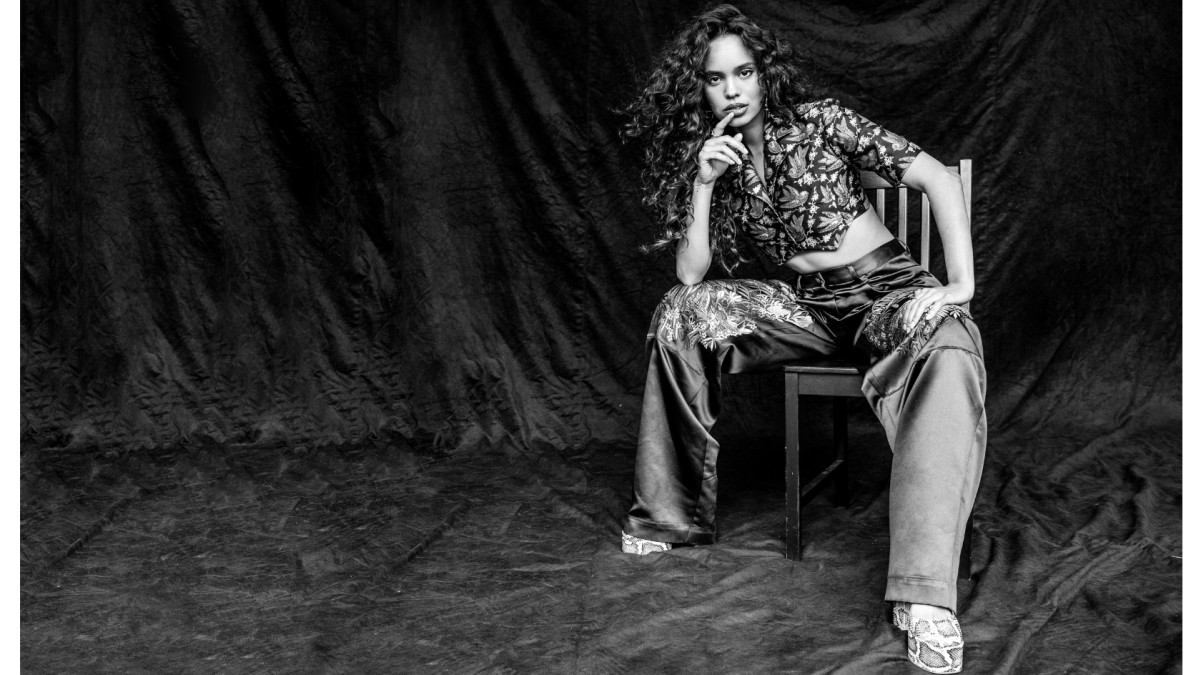
Jacket, top, and pants, Etro. Shoes, Paris Texas.
"That's why we do what we do, to move people. "
TR: You have millions of fans and followers. Is there anything that fans have reached out to you about, that sticks with you the most? Maybe it's some of those moments from 13 Reasons Why, What do you think about, when it comes to what they share and what they ask about?
AB: I think the most meaningful for me, is when someone comes up to me and tells me a story of theirs, and why they connected with the character I played. That's why we do what we do, to move people. The fact that I'm able to connect with strangers, and have them be moved by a piece of work I've done is so incredibly rewarding. I'm overusing the word...but it's such a privilege.
TR: How do you manage and think about social media, something that can become so consuming, something that requires more consideration for someone who's a public figure?
AB: I think it's easier for me because I've had social media since I was 13. Myspace, then Facebook, and when I was in high school, Instagram became very popular. I never really looked at it as a business thing, the way that many young actors do nowadays. Like, 'This is my business, I need to...'
"At first it was overwhelming, when I was younger, because I went from having a couple hundred followers to a million. There was an adjustment period, but I'm used to it now."
TR: ...Strategize.
AB: Yeah, strategize, 'My brand'. 'Maybe it would be more beneficial for me if I...'? [laughs] I'm so close to my friends who are on it, I truly communicate with my friends on Instagram, so it's still a very personal thing. I do tend to keep things a little bit more private, I guess, when it comes to the personal details and people in my life. I don't want to post my little brother all the time, because he has to go to school. I want to be careful about things like that. At first it was overwhelming, when I was younger, because I went from having a couple hundred followers to a million. There was an adjustment period, but I'm used to it now, in terms of my visibility online. It doesn't really affect me that much, I don't think about it.
'What I value the most is creating a home, because I'm always going to be in a weird, temporary apartment for six months, or a hotel room in the middle of nowhere."
TR: Do you think about the balance between your personal and professional lives? What do you value, and what do you want to keep in mind as you move through life?
AB: Work-life balance is really important. When you're an actor, you know, you're never really at home. So what I value the most is creating a home, because I'm always going to be in a weird, temporary apartment for six months, or a hotel room in the middle of nowhere. It's important to be able to ground yourself. I really value and cherish my friendships, because they are my home. They keep me so grounded, they make me feel less lonely when I'm away, they help so much.
TR: Who and what inspires you, as a creative artist? What are the kinds of things that you take in, the things get you excited about the opportunity you have as a actor, and to make more art?
AB: Finding inspiration is always a push and pull thing. Sometimes we feel really inspired, and sometimes we don't. A big part of it for me, is not forcing it, kind of just allowing life to hit me, and to sit in my feelings. You're feeling bored, and then inspiration finds you. At the end of the day, watching a really great movie that moves you, listening to a beautiful song, reading a really nice book, sharing an experience with an old friend, going on a walk, looking at all the trees--- it happens through silly little things like that. Your mind kinda goes from there. In my experience, I've found that if you force inspiration, force something to happen, it will kind of work against you. Sit in boredom, and it helps.
TR: Speaking of inspiring artists, you worked with the artist, Sarah Bahbah, who is one of our Story + Rain Talks podcast guests. You appear in her series titled Fool Me Twice. I own some of those pieces, so as it turns out, you are hanging on my wall! How did you connect with Sarah?
AB: Sarah reached out to me, and we decided to meet for dinner. I'd been following her for a while, then she reached out online, I was like, 'Yes! I would love to meet you.' We met, were hanging out and getting to know one another, and she said, 'I don't know what I'm doing next, but I'd really love to work with you.' A couple of months later, she reached out and said, 'Would you like to do my next photo series with me?' I didn't know what the project was, who was going be in it, and I just said, yes, blindly. As you know, Sarah is just such a sweet, sweet, genuine girl.
TR: How does she approach her work from a technical standpoint? You're an actor, but you had an opportunity to do this very interesting thing with an artist involving cinematic vibe, and a social media aspect. What's it like being the subject of one of Sarah Bahbah's photos?
AB: I don't do well with photography...
TR: Not according to our cover spread...I would not agree!
"Because of Sarah [Bahbah], it felt easy to move through. We were telling a story, rather than it just being Alisha and Noah [Centineo] , sitting naked in the bathtub together. "
AB: Thank you. I've had a lot of training now, but I get so nervous. I get super nervous, I feel like I freeze up, and my lip starts, like, shaking. It's interesting, I feel more comfortable, you know, saying lines and being able to talk to someone. When you're the subject of a photograph, you're the only person. You're looking at this camera and you're trying to tell a story. Especially when it comes with Sarah's work. She uses her own journal entries and her own writing; it's all very personal to her. There is this beginning, middle, and end. There is this story that we were telling. She let us look at all the text beforehand. The technicality of it, is that she tells you to keep moving. That was so much better for me, being in motion, talking to the camera. She makes it a very comfortable set. Working with Noah [Centineo], who I'd never met until that day, should have been very uncomfortable, because we were very intimate on that set. Because of Sarah, it felt easy to move through. We were telling a story, rather than it just being Alisha and Noah, sitting naked in the bathtub together. [Laughs].
TR: She's so meticulous in her vision. I know that a lot of that photo series has to do with attachment theory. Did Sarah's concept provoke you to think about it?
AB: Yeah. I think maybe a year prior to the work with Sarah, I'd heard about attachment theory for the first time. We all have different ways of naturally attaching in relationships. It definitely made me think about it more. I still don't know what mine is; I keep going back and forth. It's such a personal, intimate thing. I feel like it really exposes how you were raised. There is how you attach to friendships, to romantic relationships, and what you ultimately need to work on. There's also something about the dynamic between two specific people that can bring out a certain attachment style. It's a very interesting thing to read up on.
"Sometimes we feel really inspired, and sometimes we don't. A big part of it for me, is not forcing it, kind of just allowing life to hit me, and to sit in my feelings. You're feeling bored, and then inspiration finds you. "
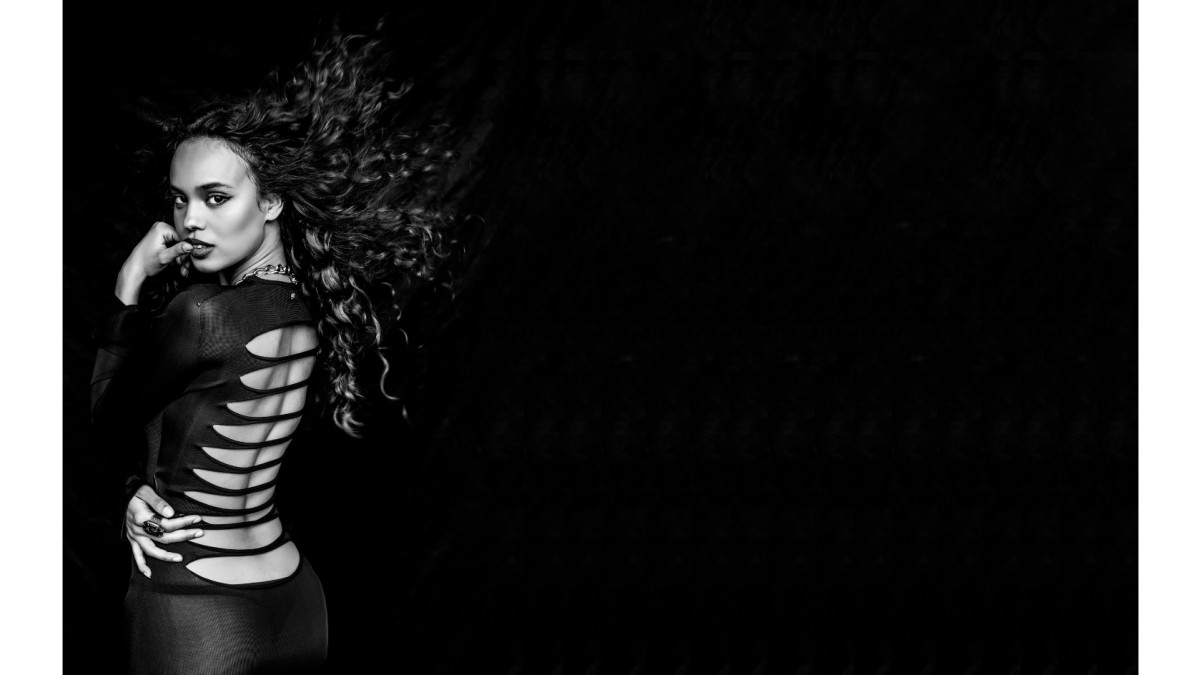
Dress and necklace, Versace.
TR: Do you find that the people that you surround yourself with and your physical surroundings affect you as an artist and as a creative?
AB: Absolutely. I get nervous if someone's talking too loud at a table, I am very sensitive to that. I'm very sensitive to my surroundings, and I feel like I'm not the same person with different people. I'm a different Alisha talking to her friend, I'm a different Alisha talking to her brother, a different Alisha talking to a stranger. I feel like environment and people---don't change who I am---but they definitely bring out different parts of me. I'm not this one constant thing. I've never functioned that way, and I don't think I ever will. Now that I think about it, I guess I'm extremely sensitive to my surroundings!
TR: You're a lover of style and fashion. What has inspired your own style, and how do you describe it?
AB: I appreciate fashion, I really do. I'm not very well versed, like some friends of mine, who are so into clothing, vintage clothing specifically, that they know the history of a piece of fabric and can go on and on about it. I've had this really interesting journey, being an actor and then also being introduced to this other side of the industry, the fashion side, which is so integrated into the performing arts.
"I feel like environment and people---don't change who I am---but they definitely bring out different parts of me. I'm not this one constant thing."
TR: Costuming...
AB: Costuming. I've been so exposed to it, and I've learned so much about it. I find that clothing, for me, needs to be something I feel super confident in, which I guess goes for everybody. I find that I'm very into silhouettes and what looks great, shapes mostly.
TR: I noticed that about you on set at our cover shoot. You're conscious of silhouette and shape, and precisely how things look. Closely considering silhouette; that mindset reminds me very much of the mindsets of the many people I've worked with over the years in the fashion industry; fashion editors, designers. That's why I wanted to ask you about style.
AB: In the last two or three years, I've learned. I've I found what works for me, my personal style, and what I want. I've paid more attention to fashion brands because I've been able to go to the shows. The work that goes into a fashion show; how beautiful a fashion show is; how the clothing sits on a body; the different tailoring, colors, fabrics---is just intriguing. I find myself, more and more, and as I get older, that, the more I pay attention to it, the more interested I become. It's such a fun process. It's an art form.
"I want to be scared before every project. I want to work with people who I can learn from. "
TR: You've worked both in the indie and commercial genres. Do you think about how you'll continue to do so in your career, or do categories not matter? Does having a career plan in that way, matter?
AB: I think it matters in terms of intention. Intention is really important when you pick projects. I'm still at a stage in my career where I just want to keep working and learning. In terms of my career plan, I want to have intention. I don't really think, 'This is an independent' [film] or 'This is a commercial '[film]. I want to read a story and care about it. It's your time that you're investing. I don't want to be on a project for three to eight months, in something I don't care about, something that's not personal to me.
TR: Is there anything else that's important to you when it comes to your career and what you want to experience?
AB: I want to continue participating in projects that I think are worth people watching, ones that I think are worth doing, ones that inspire me, ones I will learn from. I want to be scared before every project. I want to work with people who I can learn from. Those are the most important things to me, being able to create these incredible experiences that I can look back on and think, 'Wow, I learned so much'. And I also can't wait to feel like I'm a novice again, on the next project.
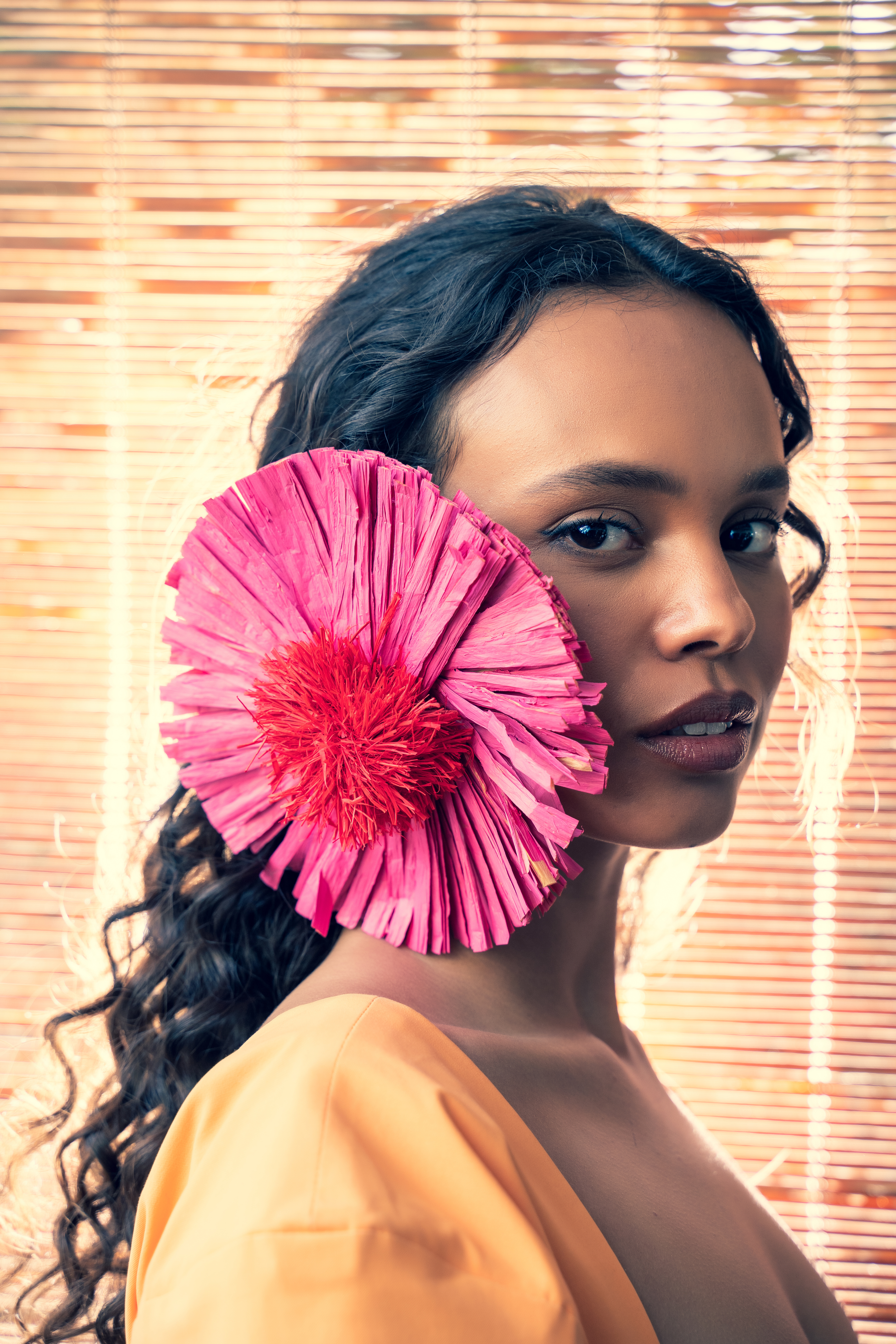
#BTS
MARCH 2023 COVER
ALISHA BOE
LOCATION
LOS ANGELES, CA
PHOTOGRAPHER
RANDALL SLAVIN
STYLIST
AMANDA LIM
THE ONLY AGENCY
HAIR
CLAYTON HAWKINS
A-FRAME AGENCY
MAKEUP
MELISSA HERNANDEZ
THE WALL GROUP
ASSISTANTS PHOTO: BING PUTNEY | FASHION: IAN MARTIN
